What We Learned from Last Night's GOP Debate

By:
On Thursday night, the GOP presidential candidates met in South Carolina for yet another debate. Here are the five most important takeaways.
1. Ted Cruz had an impressive night
Sen. Ted Cruz had a great night.
The Texas senator has always been popular with hard-right Republican voters, but to win the nomination, he has to convince the rest of the party that he has an appeal beyond evangelical Christians and Tea Party supporters. Last night, he impressively dismissed the "birther" issue — the notion that he's technically not an American citizen by virtue of being born to an American mother in Canada and therefore disqualified to be president. His rival Donald Trump has been floating this question as a way to undermine Cruz's candidacy. Cruz expertly struck back last night.
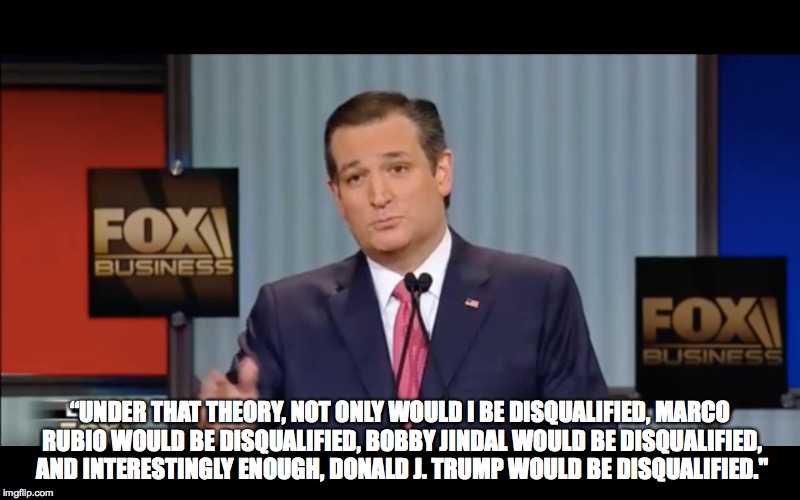 Fox Business
Fox Business
“The legal issue is quite straightforward, but I would note that the birther theories that Donald has been relying on, some of the more extreme ones insist that you must not only be born on U.S. soil, but have two parents born on U.S. soil," Cruz said. “Under that theory, not only would I be disqualified, Marco Rubio would be disqualified, Bobby Jindal would be disqualified, and interestingly enough, Donald J. Trump would be disqualified because Donald's mother was born in Scotland."
Trump tried to counter with his own legal argument, but he looked like an amateur next to Cruz, a lawyer who has argued in front of the U.S. Supreme Court.
Here's the full exchange:
2. Trump's defense of New York City was his best moment of the campaign
Cruz has recently tried out a new line of attack on Trump, saying that Trump embodies "New York values." This is a not-so-subtle dog whistle from Cruz to evangelical and Tea Party voters that says, "Donald Trump might say the right things, but he's not really like you, and he does not share your values."
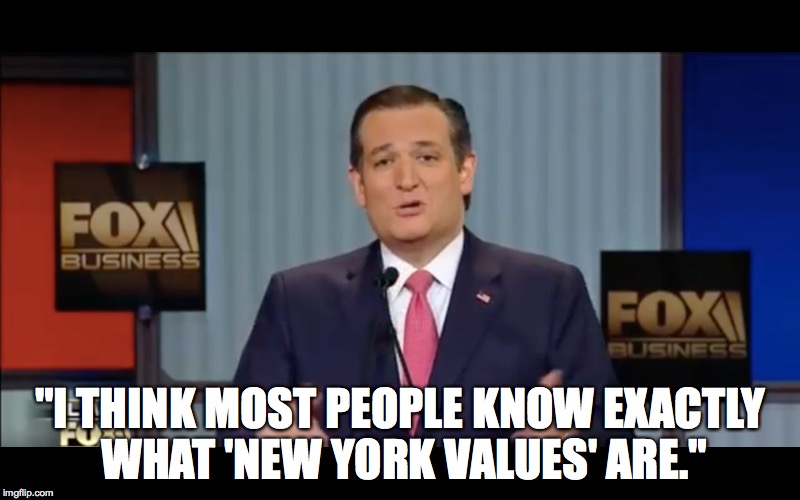 Fox Business
Fox Business
“I think most people know exactly what New York values are,” Cruz explained. "Everyone understands that the values in New York City are socially liberal, are pro-abortion, are pro-gay marriage, focus around money and the media."
"Not a lot of conservatives come out of Manhattan," Cruz added.
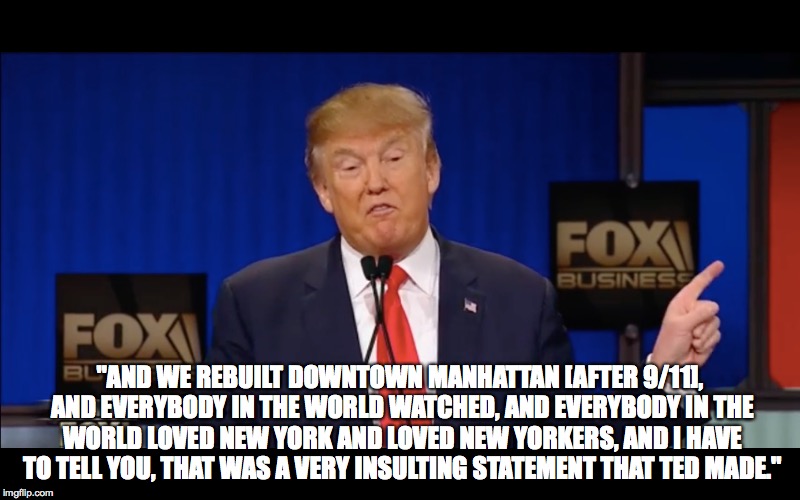 Fox Business
Fox Business
In response to all of this, Trump boldly defended his home city, referencing New York's "beautiful" and "humane" recovery after the September 11th attacks:
"Thousands of people killed and the cleanup started the next day, and it was the most horrific cleanup probably in the history of doing this. … I was down there. And I’ve never seen anything like it. And the people in New York fought and fought and fought, and we saw more death and even the smell of death; nobody understood it. And it was with us for months: the smell, the air. And we rebuilt downtown Manhattan, and everybody in the world watched, and everybody in the world loved New York and loved New Yorkers, and I have to tell you, that was a very insulting statement that Ted made."
Advantage, Trump.
What's also interesting is that a look at Cruz's background reveals that he's not exactly rooted in rural America either. Cruz's life story drips with the kind of east coast elitism that he's using against Trump. Cruz attended Princeton and then Harvard Law School. He clerked for Chief Justice William Rehnquist of the United States Supreme Court. His wife got her MBA from Harvard, studied business in Europe, and now works at Goldman Sachs in Houston. Not exactly the lives of most Republican base voters, either.
The difference between Cruz and Trump, though, is that in his public life, Cruz has been a rock-ribbed conservative from Texas whereas Trump used to embody Wall Street Republicans, who are largely economic conservatives, but socially liberal. Trump has moved to the right on social issues, notably abortion, and Cruz's "New York values" attack is an attempt to call him out for it. Unfortunately for Cruz, it fell short, and Trump had maybe his only moment in the campaign where everyone agreed with him.
You can watch the full exchange here:
3. Ted Cruz and Marco Rubio had the most interesting exchanges
For weeks, the consensus among many pundits has been that once Trump fizzles — if that ever even happens — we'll be down to two senators, Cruz and Marco Rubio. Out of those two, most consider Rubio to be the best positioned to win the nomination because he's less conservative than Cruz and therefore has a wider appeal that will help in the general election against the Democrats. But Cruz is battling Rubio to counter that notion.
Related: What Are The Odds? Professional Gamblers Place Bets On Presidential Picks
We saw this dynamic last night with Cruz and Rubio going at it on a number of issues.
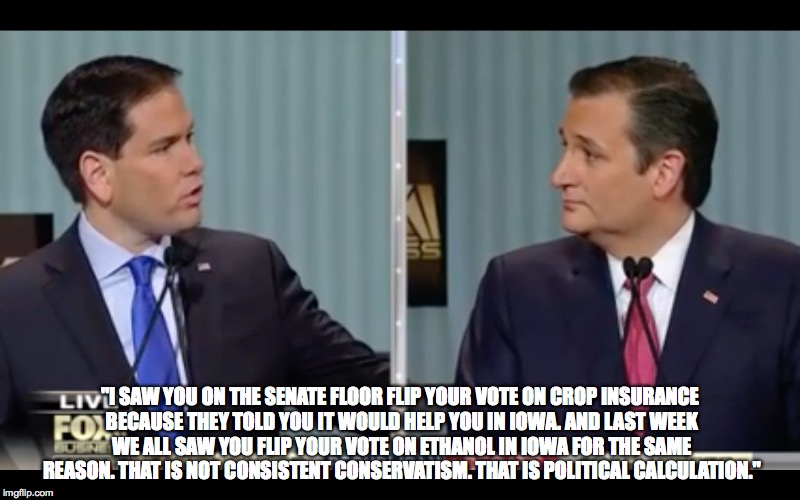 Fox Business
Fox Business
Rubio attacked Cruz's tax plan early in the night, saying that Cruz's proposed business flat tax amounts to a national sales tax that will raise prices for average Americans. Cruz countered by saying that his elimination of so many other taxes — the income tax, the payroll tax, and the inheritance tax, to name a few — will make up for businesses facing a tax increase.
Later, Cruz went after Rubio's record on immigration, one of Rubio's biggest vulnerabilities in this race. In 2013, Rubio sponsored an immigration reform bill in the Senate that would have legalized undocumented workers. (It passed the Senate, but died in the House of Representatives.) The plan was — and still is — extremely unpopular with most conservative voters. Today, Rubio has repudiated the plan, but Cruz did not let voters forget about it.
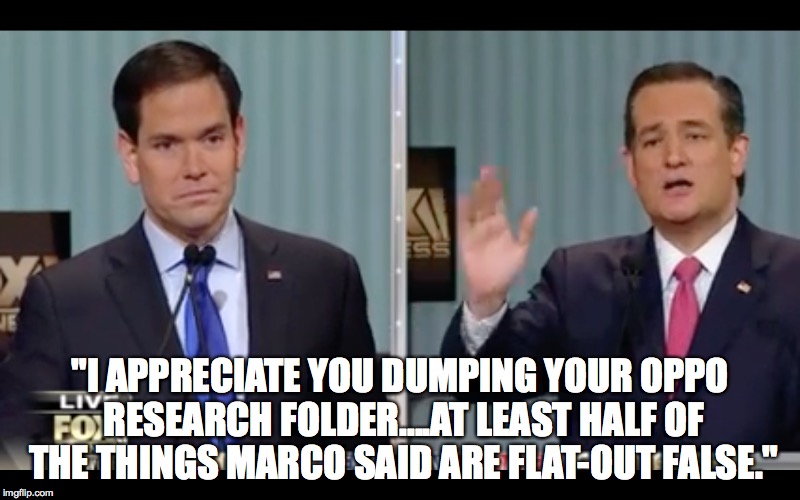 Fox Business
Fox Business
Rubio did score some points, though, when he pointed out that Cruz has seemingly flip-flopped on a number of issues for political reasons, denting Cruz's carefully maintained persona as a flawless conservative.
The most heated moment is here:
4. No one had the guts to stand up to Trump's Islamophobia
The debate panel asked each candidate if they agreed with Trump's proposal that the U.S. bar all Muslims from entering the country.
While no one went as far as agreeing with Trump, not one person condemned Trump's rhetoric about Muslims. They talked about the strategic shortfalls of Trump's plan, explaining that it's not exactly great optics to ban all Muslims while simultaneously asking Muslim nations to work with the U.S. to defeat ISIS. And some, such as Cruz, even offered up similar, but less extensive bans on migrants coming from the Middle East.
But the fact that these candidates continue to refuse to call out Trump's bigotry on this issue shows that they fear alienating the sizable amount of Trump supporters in the Republican Party who have given Trump his enduring lead in national polling since this summer.
Sure, it makes sense why they are not standing up to Trump. That does not make it any less depressing.
Related: Donald Trump Just Told Millions of People a Big Lie About Syrian Refugees at the GOP Debate
5. Rubio has the toughest challenge in these debates
While Rubio is still a good bet to win the Republican nomination (and the gamblers agree), these debates are a challenge for him because he's squeezed between the hard right-wing Cruz and Trump and the more mainstream candidates, Jeb Bush, New Jersey Gov. Chris Christie, and Ohio Gov. John Kasich. On one hand, he has to show conservative voters that he's equally or more conservative than Cruz and Trump. But at the same time, he has to show less conservative voters that he's the best mainstream candidate. As long as these debates include both the Cruz-Trump wing and the establishment wing of Bush / Christie / Kasich, Rubio will be doing a balancing act.
The good news for Rubio is that the New Hampshire primary on Feb. 9 could clear out the mainstream candidates. If Kasich and Christie do not have strong performances in New Hampshire, they'll most likely drop out the next day. And a weak New Hampshire performance from Bush could even cause the one-time frontrunner to reconsider his continued candidacy. The bad news is that there are still two more debates before New Hampshire. That means Rubio will have to walk this tight rope for another two evenings in front of a national audience. We'll see if he can pull it off.
